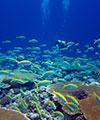April
Researchers chart course for recovery of reef fishes

Researchers have, for the first time, identified the extent to which fish populations on the world’s coral reefs have been depleted by fishing and estimated the recovery potential that different conservation measures could have.
As part of a global study into the recovery potential of coral reefs, published in the journal Nature, the researchers examined more than 800 reefs in 64 locations around the world. They found that 83% of fished reefs are missing more than half of their expected fish populations.
Coral reefs are among the most diverse ecosystems on earth, providing an important habitat for a wide range of species, and as a result, people in many tropical countries depend on them for their livelihoods.
In recent years, there have been numerous calls for more marine reserves to be introduced in order to restore coral reefs. But while there is existing research into the benefits of marine reserves, there is limited understanding of how long it takes reef fishes to recover once protected from fishing. The research team has used its findings to develop the first benchmarks for the recovery potential of fished reefs, and conclude that the most fished reefs would take an average of 35 years of protection to recover, while the most depleted areas would take almost 60 years.
The team also found that simple fishing restrictions that are more likely to be accepted by communities who depend on the reefs - such as a ban on specific fishing gears, restrictions on the types of fish that can be caught, and a limit on the number of people allowed to fish a reef - all could have a positive impact on recovery potential and support important reef processes.
Co-author of the paper, Prof. Nick Polunin from the School of Marine Science and Technology, Newcastle University, said: “In spite of coral reefs being home to thousands of species of fish and providing millions of people with food and income, until now we have had only a hazy overview of the state of coral reef ecosystems. We now know that most reef systems have been severely depleted by fishing.
“Although it’s clear that recovery often takes decades, the range of restrictions we factored into our research helps us chart a course for the recovery of coral reef fisheries that includes everyone, not just those who can afford to wall off large areas.”
Dr Aaron MacNeil, from the Australian Institute of Marine Science and lead author of the study, added: "By studying remote and marine protected areas, we were able to estimate how much fish there would be on coral reefs without fishing, and how long it should take newly protected areas to recover. This allows us to gauge the impact of reef fisheries, and make informed management decisions that include timeframes for recovery.
"Although fishing has more than halved fish numbers on many reefs, we were encouraged to find that substantial biomass remained where some form of management was in place. By keeping this extra biomass on the reef, people who chose to manage their fisheries dramatically increased their sustainability.”
While marine reserves are the most effective way of recovering fish populations, the researchers agree that a ‘one size fits all’ approach of locking away reef resources is not feasible for many communities dependent on fishing.
Dr Nick Graham from the ARC Centre of Excellence for Coral Reef Studies at James Cook University, Australia, and co-author, said: “Changes in fishing practices can result in a significant return of key fish species over time.
“Fish play important roles in the overall functioning of coral reef ecosystems, for example in controlling seaweed and invertebrates. By linking fisheries to ecology, we can now uncover important ecosystem functions for a given level of fish biomass.
"Restrictions on types of gears, species caught, or local customs, all ensured substantial recovery in fish feeding groups. However, only completely closed marine protected areas successfully returned large predatory fish to the ecosystem."
Dr MacNeil says fisheries managers have the potential to stop a key threat to coral reefs.
"Where previously we have been managing reef fisheries not really knowing how depleted fish stocks were, we now have a roadmap for recovery that tells us not only where we are with fish biomass, but where we might want to go, and how long it will take to get there” he says.
Co-author, Dr Tim McClananhan, from the Wildlife Conservation Society in New York, says: “The findings will help fishers determine how much catch to take and how much to leave behind.
"These results give clear consequences for taking too much fish, and uncover the ecological benefits of different forms of fisheries management. The methods used in this study are simple enough that fishers and managers can take the weight and pulse of their reef and keep it in a healthy range that had not previously been defined."
He adds that by choosing to conserve resources and the ecosystem functions they provide, fishers and managers have the ability to plan for recovery and help reefs remain productive in the face of increasing stress from climate disturbances.
The paper, Recovery potential of the world’s coral reef fishes by M. Aaron MacNeil, Nicholas A.J. Graham, Joshua E. Cinner, Shaun K. Wilson, Ivor D. Williams, Joseph Maina, Steve Newman, Alan M. Friedlander, Stacy Jupiter. Nicholas V.C. Polunin, and Tim McClanahan is published in the journal Nature.
Picture credit: Nick Graham
published on: 8 April 2015
